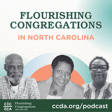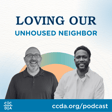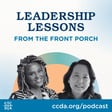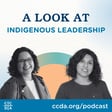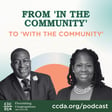Become a Creator today!Start creating today - Share your story with the world!
Start for free
00:00:00
00:00:01

From Spiritual Bypassing To Entering Into Each Other’s Pain
Dr. Peace Amadi leads this session to define spiritual bypassing, identify how it’s operated in our lives and ministries, unpack how it has negatively impacted mental health and spiritual health, individually and communally, and explore new ways of being with each other during times of emotional pain.
Recommended
Transcript
Impact of Personal Stories and Adversities
00:00:01
Speaker
because I believe our biggest impact comes out of our own story and a lot of, you know, a big part of our story is some of the adversities and the traumas we've endured.
Introduction to the CCDA Podcast and Dr. Peace Amadi
00:00:10
Speaker
And welcome to the CCDA podcast.
00:00:12
Speaker
Today, Dr. P. Samadhi and her workshop from spiritual bypassing to entering into each other's pain.
00:00:19
Speaker
This is taken from the 2021 National Conference Workshop in Kansas City.
00:00:23
Speaker
We join the workshop in progress.
00:00:26
Speaker
I am Peace Amadi, a.k.a.
00:00:30
Speaker
Dr. Peace out there in the professional world.
00:00:34
Speaker
I do have my doctorate in clinical psychology.
00:00:36
Speaker
I'm a psychology professor.
00:00:38
Speaker
What did I write up here?
00:00:39
Speaker
I'm a lover of sweet iced coffees.
00:00:41
Speaker
Very much take bribes.
00:00:42
Speaker
My students know how to get A's in my classes because if they bring me just enough coffees.
00:00:48
Speaker
No, just kidding.
00:00:49
Speaker
I'm also
Dr. Amadi's Media Influence and Mission
00:00:50
Speaker
a highly sensitive person.
00:00:51
Speaker
Any other highly sensitive people?
00:00:53
Speaker
Okay.
00:00:54
Speaker
Any other introverts?
00:00:55
Speaker
Like, you can rise to the occasion in a space like this, but after this, you need to go be alone for four years?
00:01:01
Speaker
Okay, so that's me.
00:01:04
Speaker
Professional Netflix binger.
00:01:07
Speaker
So I just got through, kind of was guilt-tripped into watching it because I was scared squid game.
00:01:12
Speaker
Okay.
00:01:14
Speaker
child like i had to watch that thing three times because i'm like there's there's so much here there's so much here i was afraid at first because no one said it was scary but they did say it was gory and so i believe i believe them but i got into it i'm like no this is really good you know but it was also like oh my gosh um it was a lot going on who else watched it okay it's like the number one it's like breaking records i'm super proud of it um solid solid you say what
00:01:45
Speaker
Season two is coming out, right?
00:01:47
Speaker
So I'm hearing all these, well, is the old man, is that?
00:01:53
Speaker
Okay, okay, don't spoil, not spoiling.
00:01:55
Speaker
Okay, no, no, okay, don't, ooh, thank you for calling me out, because I was about to ruin everybody's day.
00:02:02
Speaker
Because I hate spoilers so much.
Seeking Peace and Addressing Spiritual Bypassing
00:02:05
Speaker
Thank you, thank you, thank you.
00:02:06
Speaker
But if you want to talk about it down at the table, because I have... If we can spoil it for each other, please, let's talk.
00:02:15
Speaker
But yeah, so I'm a psychology professor.
00:02:17
Speaker
I'm a speaker.
00:02:18
Speaker
I'm a trauma-informed coach.
00:02:19
Speaker
I coach right at the intersection of mental health and business.
00:02:22
Speaker
Um, meaning that I like helping people create and do well in what I call heart centered business.
00:02:30
Speaker
So this is becoming an author, becoming a speaker, becoming a course creator, becoming a coach, all that stuff for your heart is really about like helping people come into their best selves, heal, grow, do things better.
00:02:42
Speaker
Like I love coaching people.
00:02:44
Speaker
there and I love helping people who should be doing that because they can be able to do that because I believe our biggest impact comes out of our own story and a lot of you know a big part of our story is some of the adversities and the traumas we've endured so my one mission that sort of encompasses all the things that I different do is I like to help people heal so that they can better lead and so that is a little bit of my work
00:03:11
Speaker
I do want to mention that I'm an author of this book, Why Do I Feel Like This?
00:03:17
Speaker
I'm really excited that it hit number one on Amazon's new releases for mental health.
00:03:24
Speaker
So really proud of that.
00:03:26
Speaker
And yeah, what we're talking about today comes directly from the book.
00:03:31
Speaker
It's literally chapter one.
00:03:34
Speaker
So that being said, I think I got all the housekeeping.
00:03:39
Speaker
Okay.
00:03:39
Speaker
Let me be therapist-y.
00:03:41
Speaker
On a scale of one to 10, 10 being the most at peace you've ever been in your life.
00:03:51
Speaker
Tell me with your fingers where you are, like in this moment, 10 being the most at peace you've ever been.
00:03:57
Speaker
Where are you in this moment?
00:03:59
Speaker
Okay.
00:03:59
Speaker
I see.
00:04:00
Speaker
Okay.
00:04:03
Speaker
Interesting.
00:04:04
Speaker
Okay.
00:04:06
Speaker
Okay.
00:04:07
Speaker
And that's probably for different reasons, but okay.
00:04:10
Speaker
We're going to come back to that.
00:04:12
Speaker
Um, thank you for sharing.
00:04:13
Speaker
So I wanted to start with a story and I'm going to tell this story straight, straight from the book.
00:04:21
Speaker
And then we're going to talk about some things that okay with you.
00:04:26
Speaker
You guys hear me okay?
00:04:27
Speaker
I'm fighting the urge.
00:04:30
Speaker
You guys, just forgive me, okay?
00:04:32
Speaker
Just... I'm like, I do this... Ooh, Lord.
00:04:39
Speaker
I do this in my
Personal Stories and Systemic Issues in Spiritual Communities
00:04:40
Speaker
classrooms.
00:04:41
Speaker
Am I ashy?
00:04:41
Speaker
No, I should... Ooh, kind of.
00:04:42
Speaker
Okay, don't look.
00:04:43
Speaker
Don't look down.
00:04:44
Speaker
I do this in my classrooms.
00:04:46
Speaker
My students know me like, there she go.
00:04:48
Speaker
But... I've been in those all day.
00:04:51
Speaker
And y'all, I've been trying, but I can't do it no more.
00:04:54
Speaker
Thank you.
00:04:55
Speaker
See, now I'm at a 10 out of 10.
00:04:56
Speaker
All right, here we go.
00:04:59
Speaker
Some years ago, I sat in a pew hoping for a message that would encourage my heart.
00:05:05
Speaker
I was fresh out of a breakup and as a woman in her 30s, I was starting to experience real doubt that I would ever get my own happy ending.
00:05:13
Speaker
I was also sick and tired of trying to figure dating out.
00:05:17
Speaker
Church, however, was a place I'd always found solace and hope.
00:05:22
Speaker
So I prayed that God would somehow speak to me that morning and crossed my fingers he would.
00:05:28
Speaker
About three-fourths into the sermon, I realized this was not going to be the message that encouraged my faith.
00:05:34
Speaker
It was not going to be the message that helped me feel understood.
00:05:38
Speaker
In fact, this was a message I would remember for a long time for how frustrated it made me and so many other women, which I found out soon after service.
00:05:48
Speaker
See, at this point in the message, the pastor detoured into talking about relationships, and everybody perked up.
00:05:54
Speaker
You could tell he'd struck a chord.
00:05:57
Speaker
He proceeded to talk about the beauty of God's timing, trusting the process, and trusting God at his word.
00:06:04
Speaker
All stuff I'd heard before, but a word doesn't have to be new to be good.
00:06:09
Speaker
Then came his final exhortation on the topic.
00:06:12
Speaker
Something to the tune of, so ladies, you need to stop worrying and start working.
00:06:18
Speaker
If you're not married, it's because you're not ready to be.
00:06:21
Speaker
How do I know that?
00:06:22
Speaker
If you were ready, you would be.
00:06:28
Speaker
I froze.
00:06:30
Speaker
Spoiler alert, this is me.
00:06:32
Speaker
I froze.
00:06:34
Speaker
The rest of my row, mostly women, froze also.
00:06:38
Speaker
I could feel us collectively saying, what did he just say?
00:06:42
Speaker
Being a church girl my whole life, I was used to disagreeing with the pastors and the pulpit.
00:06:47
Speaker
It happens.
00:06:48
Speaker
In fact, if you told me that you agreed with every single thing your spiritual leader said, I'd be worried that you're not doing enough thinking on your own.
00:06:55
Speaker
I love you guys.
00:06:57
Speaker
I was used to letting things I disagreed with roll off my back and taking from the message only what I felt God really wanted me to hear.
00:07:05
Speaker
I was also used to hard words, words that pierced through sin in a way you just knew would change you.
00:07:12
Speaker
But these words weren't hard.
00:07:14
Speaker
They were antagonistic.
00:07:16
Speaker
Because from that position of power and influence came a message that dismissed and invalidated the reality of so many.
00:07:23
Speaker
It invalidated the challenges of dating in our current culture, a culture where surface transactional, what can I get from you, relationships seem to be
Moving from Bypassing to Empathy and Genuine Engagement
00:07:30
Speaker
the norm.
00:07:31
Speaker
It invalidated the challenges of dating while trying to remain abstinent, if that's your choice, which significantly limits your options because many just don't share that value.
00:07:40
Speaker
It invalidated the real worries of women past their 20s who confront all kinds of discouraging messages about the ability to find love and start families.
00:07:48
Speaker
It invalidated the work and prayers that grown women have already done in preparation for their marriages and the weariness and discouragement that comes from years without results.
00:07:58
Speaker
The pastor's words invalidated these realities and more.
00:08:01
Speaker
What was particularly off-putting, however, were the implications around this idea of readiness.
00:08:07
Speaker
I was a black professor at a Christian, conservative, predominantly white institution where a ring before spring was a thing.
00:08:14
Speaker
Every year I witnessed a good number of my senior students get engaged and even married by commencement.
00:08:19
Speaker
I'd get invited to these weddings and happily attend them, and they were always beautiful.
00:08:25
Speaker
But the implication of the pastor's words were that these young, mostly white women were all ready for marriage, but the woman over 30 I knew, many of them from diverse backgrounds, were not.
00:08:36
Speaker
The pastor's statement didn't work for me.
00:08:38
Speaker
The reason for singleness at this time had to be more complicated than just readiness.
00:08:43
Speaker
And instead of taking the time to speak into any number of these realities, which granted was a big task,
00:08:49
Speaker
The pastor met our woes with over-spiritualized, trite, hurtful words.
00:08:54
Speaker
I'd gone to church looking for hope and encouragement.
00:08:57
Speaker
I left church feeling emotionally dismissed, deflated, and misunderstood.
00:09:05
Speaker
We're talking this morning about spiritual bypassing, and there's going to be three or four times I'm going to have you guys talk in small groups, so get ready to talk and just know that if I'm talking about something and you want to respond, you're going to get that time.
00:09:20
Speaker
But I wanted to define this for you.
00:09:22
Speaker
So I'm kind of like in a weird angle.
00:09:25
Speaker
So spiritual bypassing is coined by a psychotherapist and author by the name of John Wellwood.
00:09:33
Speaker
And it describes when we or other people use spiritual ideas to belittle our needs, feelings, or personal challenges, or to sidestep deep, necessary emotional work.
00:09:47
Speaker
And then I further write in my book, after defining this, that it's when we dole out Christian platitudes and expect the recipient of these easier said than done words to bounce right back into contentment and happiness,
00:09:59
Speaker
It's the equivalent of slapping a fresh cut with a bandage and hoping that any signs of infection will resolve without additional effort.
00:10:07
Speaker
We and our emotions deserve better.
00:10:11
Speaker
Here are some examples of spiritual bypassing that I want us to sit with, and then I'm going to have you guys think about where this may have happened for you and in what way.
00:10:22
Speaker
Obviously, all of our stories are very different.
00:10:25
Speaker
And I do want to say before I read this list that it's not that there isn't truth, some truth, some degree of truth to at least some of them.
00:10:35
Speaker
Um, but that doesn't mean that it's the right thing to say at a particular moment.
00:10:42
Speaker
So here are some examples of spiritual bypassing.
00:10:45
Speaker
Just pray about it.
00:10:46
Speaker
Just let go and let God just forgive.
Reflections and Improvements in Empathetic Practices
00:10:50
Speaker
And I do want to say, again, if you've been someone who's said any of these things, this isn't a place of judgment.
00:10:55
Speaker
I would just ask that you kind of consider, you know, another, the other way.
00:11:03
Speaker
Just forgive.
00:11:04
Speaker
Just have faith.
00:11:05
Speaker
Just don't worry about it.
00:11:07
Speaker
You have so much to be grateful for.
00:11:09
Speaker
If you were supposed to have it, you would.
00:11:12
Speaker
Everything happens for a reason.
00:11:15
Speaker
That last one I also write about and I talk about, and it seems to be my most controversial statement, saying that I do not believe that everything happens for a reason.
00:11:25
Speaker
And a lot of that comes from personal history,
Conclusion and Invitation to Engage Further
00:11:30
Speaker
but probably even more so just being in the trenches with people and their pain.
00:11:35
Speaker
Being a mental health professional, being a psychology professor, working with people who've been raped, molested by their fathers, uncles, mothers, poverty, terminal illness, people losing their children, people losing their parents, untimely.
00:11:52
Speaker
And I just can't sit there and say, oh, you know, God wanted you to be raped for this reason.
00:11:58
Speaker
Like, that's just not good theology for me.
00:12:01
Speaker
And if you want to dialogue about it further, I'm happy to because I do all my classes and everything.
00:12:06
Speaker
And again, I do write about it.
00:12:07
Speaker
But I've just come to the place where my understanding of why things happen or I don't know that we'll ever know why things happen.
00:12:16
Speaker
So I like to say that I don't believe everything happens for a reason, but I do believe in everything we can create to purpose.
00:12:22
Speaker
Um, and that's redemptive in and of itself.
00:12:24
Speaker
And that's what helps us heal creating purpose out of our pain, but you can't have me sit here and say, yeah, you, God wanted you to go through that.
00:12:30
Speaker
So I'm pretty sure God and his infinite intelligence and creativity can find other reasons to teach me a lesson without getting me raped.
00:12:38
Speaker
Pretty sure God's better than that, but you know, yeah, I digress.
00:12:42
Speaker
Um, uh, so yeah.
00:12:46
Speaker
Here's my first reflection question that I want you guys to talk about in small groups.
00:12:51
Speaker
Can you think of any other examples, specifically even from your life?
00:12:56
Speaker
What has spiritual bypassing looked like for you?
00:12:59
Speaker
What was the impact?
00:13:01
Speaker
How did it feel?
00:13:02
Speaker
Okay, so I shared my story of what was said to me, because I don't think that list is exhaustive in any way.
00:13:09
Speaker
But has there been a time you can think of where in church or in faith community or in one-on-one with a spiritual leader or someone of faith, you shared being in a time of emotional pain or confusion or overwhelm or sadness, and somebody said something Christian-y to you, and it just didn't work.
00:13:29
Speaker
Okay.
00:13:30
Speaker
um turn into groups of like three four or five whatever works for you and share about that time if you can or at least listen to each other and give you like five seven minutes
00:13:42
Speaker
Come on back.
00:13:42
Speaker
You're going to get more time to kind of pick up where you left off.
00:13:46
Speaker
Jeez, time is already flying.
00:13:49
Speaker
I'd love to hear from a few of you.
00:13:51
Speaker
Just kind of take like four, like one from the back, front, back, front.
00:13:56
Speaker
Anyone from back there be willing to share soup, like 30 seconds or less?
00:14:00
Speaker
Yeah.
00:14:01
Speaker
And say your name.
00:14:02
Speaker
Amen.
00:14:02
Speaker
Yeah.
00:14:03
Speaker
Yeah.
00:14:03
Speaker
I love that.
00:14:04
Speaker
It goes to show to that point of that.
00:14:06
Speaker
These aren't like bad things to say, but that wasn't the moment to say it.
00:14:11
Speaker
It's cutting somebody off while they're in the middle of the pain to tell them you're praying for them.
00:14:15
Speaker
First of all, you're probably not going to.
00:14:18
Speaker
Secondly, that, you know, we'll, we'll, we'll talk about what it means to actually enter into someone's pain.
00:14:22
Speaker
Thank you for sharing that.
00:14:23
Speaker
Someone from back here, this side back.
00:14:27
Speaker
Yeah.
00:14:29
Speaker
Of course, wouldn't anybody.
00:14:32
Speaker
Wow, yeah, that's another good example.
00:14:35
Speaker
I'm so sorry to hear that.
00:14:38
Speaker
Someone from up here?
00:14:39
Speaker
This side, yeah.
00:14:42
Speaker
Yeah, that's exactly, that's the exact implication of what that is.
00:14:47
Speaker
And I think we can all safely say these people probably mean well, but it's missing a very big mark.
00:14:53
Speaker
Thank you for sharing.
00:14:54
Speaker
And then maybe someone from up here?
00:14:57
Speaker
Anybody?
00:15:00
Speaker
Yeah.
00:15:02
Speaker
Ooh, we feel that.
00:15:04
Speaker
Yeah.
00:15:06
Speaker
Yeah.
00:15:06
Speaker
Yeah.
00:15:08
Speaker
Cause it's like, nope, I'm not handling this.
00:15:10
Speaker
Yeah.
00:15:11
Speaker
The reality of the situation is, is we often get more than we can handle, which is why we deal or undeal, you know, with the things that happen to us.
00:15:19
Speaker
And it's just being human.
00:15:21
Speaker
Um, yeah, yeah, yeah.
00:15:32
Speaker
Yes.
00:15:32
Speaker
Raise your hand if you've done.
00:15:34
Speaker
Yes.
00:15:35
Speaker
And that's what happens.
00:15:36
Speaker
Yeah.
00:15:37
Speaker
Yes.
00:15:38
Speaker
Oh, you got workshop over.
00:15:42
Speaker
Literally, we can see it.
00:15:43
Speaker
We can call it out and recognize the fact that we hear it so much that we start doing it to ourselves.
00:15:48
Speaker
And we need to unlearn that because that is not fair to us.
00:15:50
Speaker
And I do not believe that's what God wants for us either.
00:15:53
Speaker
I do not believe that's what he wants for community and for relationship and for, you know, how we treat ourselves.
00:15:58
Speaker
And I have many scriptures to support that.
00:16:00
Speaker
But yeah.
00:16:01
Speaker
you know, that'll be next year.
00:16:04
Speaker
All right.
00:16:05
Speaker
So I'm going to move quickly into this part, like why this is a problem.
00:16:09
Speaker
We're talking about spiritual bypassing.
00:16:11
Speaker
You guys have a solid definition.
00:16:13
Speaker
You have very real examples of this happening to you.
00:16:15
Speaker
And even, I love this last point, doing it to ourselves.
00:16:18
Speaker
So why is this a problem?
00:16:20
Speaker
How is this, you know, you know that phrase, so I'm kind of stealing this concept from that phrase, do the work.
00:16:27
Speaker
We know that phrase, right?
00:16:28
Speaker
Do the work, do the inner work, the real psychological work or whatever.
00:16:32
Speaker
Spiritual bypassing is anti-work.
00:16:34
Speaker
And here's why.
00:16:35
Speaker
And again, I'm going to run through these really quickly and then I'm going to give you time to sit with them and see what strikes a chord and there'll be time for questions at some point.
00:16:42
Speaker
So here are the four problems I've named behind spiritual bypassing.
00:16:47
Speaker
One, it robs us of true connection and true communion and true community, which I think we can all agree is like the thing God wants for us, right?
00:16:58
Speaker
I mean, that is what helps reconcile us to him.
00:17:02
Speaker
It's community.
00:17:02
Speaker
It's each other.
00:17:03
Speaker
It's relationship.
00:17:05
Speaker
But things like feeling dismissed, feeling judged, feeling belittled, feeling minimized, condescension, all of that is a very shaming experience and shame is a very isolating experience.
00:17:16
Speaker
So when we are left feeling these ways, we're robbed of connection and belonging.
00:17:23
Speaker
Shame is the literal antithesis of belonging and connection and belonging and connection is literally our single most important fundamental need.
00:17:34
Speaker
So spiritual bypassing robs us of our fundamental need for connection and communion in that moment.
00:17:42
Speaker
Okay, moving on again, I'll give you guys a second to chat about this in a few.
00:17:49
Speaker
It hijacks our healing.
00:17:50
Speaker
So this is a big part of what I've been talking about, big part of what I wrote about, of just the whole purpose of emotions and particularly negative emotions.
00:18:01
Speaker
Emotions, difficult emotions are our allies.
00:18:05
Speaker
They're our advocates, they're our friends.
00:18:07
Speaker
Pick the word that resonates the most with you.
00:18:10
Speaker
Because difficult emotions alert us to the fact that something is wrong.
00:18:15
Speaker
Something is wrong maybe in a relationship, in our friendships, in our community.
00:18:20
Speaker
Something is wrong in our lives.
00:18:23
Speaker
It points to the fact that something is wrong, something is missing, something is false, or some deep need has gone unmet.
00:18:32
Speaker
Think about it.
00:18:33
Speaker
Think about the difficult emotions you've experienced over your lives.
00:18:38
Speaker
During your lives, they're all trying to tell you something.
00:18:42
Speaker
Okay.
00:18:43
Speaker
Some of the examples that I've been recently talking about before I even get to this depression one is anxiety.
00:18:49
Speaker
Can I talk about anxiety is what we feel when we don't feel safe?
00:18:55
Speaker
Anxiety is trying to tell us something is not safe or you don't feel safe right now in something, whether it be school, whether it be your community, whether it be your, you know, your own beliefs, you know, whether it be your place in the world.
00:19:11
Speaker
You know, it's not surprising to me that since the pandemic, anxiety and depression, do you guys know this has skyrocketed?
00:19:21
Speaker
And what we've lost, two things.
00:19:23
Speaker
We've lost a sense of predictability, which is the single most important factor of safety.
00:19:29
Speaker
Hopefully you guys are making these connections.
00:19:31
Speaker
What makes us feel safe?
00:19:32
Speaker
Predictability.
00:19:33
Speaker
What did we lose during the pandemic?
00:19:35
Speaker
Predictability.
00:19:36
Speaker
We also lost connection.
00:19:38
Speaker
So our single most important needs, connection, belonging, being together, and a sense of stability and security that comes from predictability, we lost.
00:19:47
Speaker
Of course, I'm not surprised that anxiety and depression is going to go through the roof.
00:19:52
Speaker
All those feelings are telling us is that something is wrong, right?
00:19:58
Speaker
We are no longer operating in the way that we were designed to operate.
00:20:02
Speaker
We've lost something that we need.
00:20:04
Speaker
That's not our fault.
00:20:05
Speaker
That's our emotions advocating for what we need, what we need to get back into our lives.
00:20:10
Speaker
Am I making sense, peeps?
00:20:13
Speaker
Okay.
00:20:13
Speaker
So my example here was depression.
00:20:15
Speaker
Depression may be the result of a chemical imbalance or childhood trauma, but it could also be the result of social disconnection, of loneliness, of a loss of a sense of meaning and purpose in your life.
00:20:26
Speaker
And so if you understand that your emotions are allies, they're advocates, they're friends, the question should be,
00:20:32
Speaker
Why do I feel like this?
00:20:34
Speaker
What is this emotion trying to tell me?
00:20:36
Speaker
What am I missing in my life?
00:20:38
Speaker
What need is going unmet?
00:20:40
Speaker
And how can I get that back in my life?
00:20:41
Speaker
That's all my emotion is trying to do.
00:20:43
Speaker
Okay, so because of that, difficult emotions create a pathway for healing, literally telling us what we need to be better.
00:20:52
Speaker
Literally telling us what we need to be better.
00:20:56
Speaker
What a gift emotions are.
00:20:57
Speaker
What a gift difficult emotions are.
00:21:02
Speaker
But when we spiritually bypass that, when we allow ourselves to be spiritually bypassed or when we spiritually bypass ourselves, we miss that.
00:21:09
Speaker
OK, we kind of close the door on on a pathway right back to our healing.
00:21:17
Speaker
That's the second problem.
00:21:22
Speaker
Hi, I'm Lorenzo.
00:21:23
Speaker
What I love about CCDA is being connected to so many amazing leaders across the country.
00:21:28
Speaker
Welcome to the CCDA podcast.
00:21:33
Speaker
Third problem, I love talking about this, spiritual gaslighting.
00:21:38
Speaker
Spiritual bypassing can lead to spiritual gaslighting.
00:21:41
Speaker
I kind of mentioned this earlier in the panel.
00:21:44
Speaker
What is spiritual gaslighting?
00:21:45
Speaker
And that's a post, FYI, from my Instagram.
00:21:48
Speaker
If you like this type of stuff, talking about this stuff, please connect with me because I talk about this all day and I often have workshops and programs and all this stuff where we dive into this and I'm realizing a lot of people are ready to talk about bypassing and
00:22:02
Speaker
spiritual gaslighting and spiritual manipulation and church hurt and all of that stuff.
00:22:06
Speaker
And I'm heck bent on helping us do better as a church.
00:22:10
Speaker
Cause I do love God and I do love the church.
00:22:13
Speaker
Anyway, spiritual gaslighting describes when a spiritual leader uses spiritual concepts,
00:22:19
Speaker
to manipulate you into questioning your own sanity, reality, memory, or spiritual standing.
00:22:26
Speaker
During spiritual gaslighting, words, actions, or inactions are used to discredit your experience, intelligence, interknowing, or your own connection with the sovereign.
00:22:37
Speaker
So that's the result.
00:22:38
Speaker
So anything used, words, action, inaction, that leaves you
00:22:42
Speaker
And discrediting your own experience, your own reality, your own perspective, your own intelligence, your own critical thought, your own standing with the creator, you've been manipulated using spiritual concepts.
00:22:55
Speaker
And so if you were at the panel, raise your hand again if you were at the panel, you saw me, I gave a very lengthy message.
00:23:01
Speaker
emotional raw, because it's still quite raw, because it actually has not been resolved.
00:23:07
Speaker
But story of how this higher up had said, pretty much the reason why I'd excluded you from something you should very much be a part of is because I prayed about it.
00:23:19
Speaker
So now I'm like...
00:23:20
Speaker
My intelligence and my critical thinking and my inner knowing tells me I need to be a part of this.
00:23:25
Speaker
In fact, I need to be running this thing.
00:23:26
Speaker
Who else would do this, right?
00:23:28
Speaker
But you're over here telling me that God, for some reason, told you that...
00:23:35
Speaker
they don't make sense for me to do that.
00:23:36
Speaker
You're only person of color.
00:23:37
Speaker
You're only black person at your university.
00:23:40
Speaker
Does that make sense, y'all?
00:23:41
Speaker
Okay.
00:23:42
Speaker
I'm like, but I was left feeling like, what?
00:23:45
Speaker
Okay.
00:23:45
Speaker
Yeah.
00:23:46
Speaker
Maybe, maybe God does want to do this work through the same, you know, demographic and, and, and maybe I shouldn't like, I'm literally because a person of power is telling me they prayed about something, you know?
00:23:59
Speaker
And so I'm like, Oh, well maybe.
00:24:01
Speaker
And then I had to say like, no, no,
00:24:03
Speaker
This man is gaslighting me, spiritually gaslighting me with prayer.
00:24:07
Speaker
And that's what that is.
00:24:09
Speaker
So if you're left feeling like that.
00:24:11
Speaker
So spiritual bypassing is not quite this, but it can lead to this.
00:24:13
Speaker
Because when you begin to bypass real emotions, my emotion in this conversation was anger, frustration, confusion, perplexion.
00:24:21
Speaker
Is that a word?
00:24:22
Speaker
Perplexity.
00:24:23
Speaker
Come on, Dr. Mani.
00:24:24
Speaker
Okay.
00:24:24
Speaker
Perplexity.
00:24:26
Speaker
Okay.
00:24:27
Speaker
Those were my emotions.
00:24:28
Speaker
Those were bypassed.
00:24:29
Speaker
Okay.
00:24:30
Speaker
And then, you know, his reasoning was a gaslighting example.
00:24:33
Speaker
Do you guys see that connection?
00:24:35
Speaker
Okay.
00:24:36
Speaker
And the fourth problem.
00:24:38
Speaker
Oh, actually under this, um, spiritual gaslighting post, I'm just going to read two of them.
00:24:44
Speaker
Um, well, here are some of the comments.
00:24:46
Speaker
So, you know, I was like, wow, a lot of people are resonating with this, but this first one up here, this is just a response to my gaslighting post that you've not prayed hard enough.
00:24:54
Speaker
Vex is my soul.
00:24:55
Speaker
Like what else do I do?
00:24:56
Speaker
Tear my cloth and walk the streets, praying, climb on the, uh, climb on the top of a mountain and star for 40 days and 40 nights.
00:25:03
Speaker
Like I don't get it.
00:25:04
Speaker
Can't, do we feel him or do we not feel him?
00:25:07
Speaker
You know, like when you're wanting, yearning, desiring for something, the response being, you know, you're not praying enough.
00:25:14
Speaker
You don't have enough faith.
00:25:15
Speaker
I mean, it's like, what else do you want me to do?
00:25:18
Speaker
I've been praying for this thing for years.
00:25:20
Speaker
There's got to be another understanding.
00:25:22
Speaker
There's got to be something else.
00:25:24
Speaker
Or it just is what it is.
00:25:25
Speaker
But tell me something.
00:25:26
Speaker
Don't just tell me I'm not praying enough.
00:25:28
Speaker
I'll read just half of this one because it's like super long.
00:25:31
Speaker
Okay.
00:25:33
Speaker
All of this is why I left the church, not God, but the church almost 10 years ago.
00:25:39
Speaker
The church culture is not the life-giving or healing at all, or healthy for that matter.
00:25:46
Speaker
And even if you have preachers who teach the message pretty well, you'll still be on the lookout.
00:25:51
Speaker
You'll still have to be on the lookout because there's usually something that they will preach on from a shame and condemnation stance, either about the people they're speaking to, like you're not doing enough, or
00:26:01
Speaker
Or holding on to something or you're whining or whatever or teaching stories from the Bible about certain people from the Bible in that mode.
00:26:07
Speaker
It's so ignorant and I mean that on every level possible.
00:26:10
Speaker
And I've seen the church let itself off the hook for how it treats people way too many times with the whole you can't expect anyone to be perfect.
00:26:18
Speaker
Nobody's perfect and nobody can satisfy you but Jesus.
00:26:20
Speaker
Like it's really a convenient way to let themselves off the hook for any kind of relationship responsibility.
00:26:25
Speaker
That's a very real point.
00:26:27
Speaker
Totally ignoring what the Bible says about how our relationships with each other are supposed to be and overlooking the fact that all those commands and exhortations were given to imperfect people, which means God will give us the strength to carry them and walk through the messes together.
00:26:39
Speaker
I think you get the message of her point.
00:26:41
Speaker
But these are people who are obviously frustrated with things like bypassing and gaslighting.
00:26:46
Speaker
Here's the last problem.
00:26:47
Speaker
And I'm going to have you guys think for a second and talk back to me.
00:26:50
Speaker
Um, spiritual bypassing can create a sense of disconnection from God.
00:26:54
Speaker
So this is another thing I, um, write our emotions draw us back to God.
00:26:59
Speaker
Happiness gives us reason to praise him.
00:27:01
Speaker
Hurt, anger, and distress gives us reason to seek him.
00:27:04
Speaker
Confusion causes us to seek his counsel and disagree in discouragement and weariness.
00:27:09
Speaker
We look for his encouragement and hope.
00:27:11
Speaker
In loneliness, we look for his companionship.
00:27:14
Speaker
In grief and sorrow, we're in desperate need of his comfort.
00:27:17
Speaker
Our emotions are often a catalyst for communion with God.
00:27:21
Speaker
And so when we bypass all of that, when we bypass the ugly stuff, the uncomfortable stuff, the stuff that we don't have words for, because that's probably a big part of the problem.
00:27:29
Speaker
People don't know what to say, and we're going to talk about it.
00:27:32
Speaker
We lose this.
00:27:34
Speaker
We lose the thing that we all, I think, genuinely believe is the most important thing, connecting back to God.
00:27:41
Speaker
So my question for you now is, which of these four strike a chord for you?
00:27:47
Speaker
So back in those groups, which of the four, do you guys remember them?
00:27:51
Speaker
I'll go back.
00:27:52
Speaker
Robbing us of connection, belonging and community, hijacking our healing, leading to spiritual gaslighting,
00:28:04
Speaker
and creating a sense of disconnection from God.
00:28:06
Speaker
Those are four, again, non-exhaustive lists of problems with spiritual bypassing.
00:28:11
Speaker
The other way you can understand this is this is the why.
00:28:14
Speaker
This is the why I'm talking about this.
00:28:15
Speaker
This is the problem.
00:28:17
Speaker
These are the things that bypassing is leading to, and that's why we should care.
00:28:20
Speaker
So back in your groups, which one or which couple, or maybe it's all of them, strike a chord for you and why?
00:28:28
Speaker
I'll call you back in 5 to 7.
00:28:31
Speaker
All right, let's wrap it up.
00:28:34
Speaker
Wrap it up.
00:28:36
Speaker
All right.
00:28:37
Speaker
I put my shoes back on, so I'm feeling important again.
00:28:41
Speaker
Here I am.
00:28:44
Speaker
Let's get a couple responses.
00:28:46
Speaker
Anyone willing to share which ones?
00:28:47
Speaker
Yeah, back there.
00:28:50
Speaker
Can we applaud that?
00:28:52
Speaker
Because...
00:28:59
Speaker
Yeah, yeah.
00:29:01
Speaker
It actually almost made me, your story is actually making me a little emotional.
00:29:05
Speaker
It's just, God bless you.
00:29:09
Speaker
Thank you for sharing and God bless you.
00:29:12
Speaker
That's just so real.
00:29:13
Speaker
And that's what's real.
00:29:16
Speaker
That pain, that confusion, that, hold up, I don't know about this anymore.
00:29:20
Speaker
Am I crazy?
00:29:21
Speaker
It is God.
00:29:22
Speaker
You know, that's the real process.
00:29:24
Speaker
Like that is typical.
00:29:26
Speaker
That is not the exception to the norm.
00:29:29
Speaker
You know what I mean?
00:29:30
Speaker
Like that is what being a person of faith and going through life is.
00:29:36
Speaker
But, you know, it'll be like, you know, just the regular church that, you know, Christians are just.
00:29:42
Speaker
we're good.
00:29:43
Speaker
You know what I mean?
00:29:44
Speaker
Like we get sad for a day.
00:29:45
Speaker
We don't go to bed in our anger.
00:29:47
Speaker
And, you know, um, I mean, I'm not, I mean, again, like I'm deeply rooted in my faith, but the faith that I have now is not the faith that I had at seven, 11, 16, 20, 25.
00:29:57
Speaker
You know what I mean?
00:29:57
Speaker
Like it has been a process for me too.
00:30:00
Speaker
Um, and I feel so much healthier than I've ever felt before and so much closer to an actually real God and
00:30:07
Speaker
than I've ever felt before in my personal journey.
00:30:11
Speaker
So I just really appreciate you sharing.
00:30:13
Speaker
Thank you.
00:30:14
Speaker
Anybody else want to share?
00:30:15
Speaker
Yeah, right up here.
00:30:18
Speaker
Yeah, yeah, yeah, yeah.
00:30:20
Speaker
Yeah.
00:30:22
Speaker
Yes.
00:30:23
Speaker
Yes.
00:30:25
Speaker
Yeah.
00:30:25
Speaker
Yeah, yeah, yeah.
00:30:26
Speaker
Can we applaud that too?
00:30:29
Speaker
Yeah.
00:30:32
Speaker
I appreciate you all.
00:30:33
Speaker
And I just hope, I hope even, I hope you all take from these stories as much as you would take from what I'm saying, because that, that's where the transformation is hearing each other's stories, what we've been through and what we're, what we're needing to get by.
00:30:45
Speaker
So thank you so much for sharing.
00:30:48
Speaker
Um, okay.
00:30:49
Speaker
This time I'm looking at is an enemy of progress, but let's see.
00:30:55
Speaker
Let's get to this, you know, the actually take home points.
00:30:58
Speaker
And again, I'm going to give you another time and then we'll take questions at the end and we'll wrap it up real nicely as possible in the next 25 minutes.
00:31:06
Speaker
Entering each other's pain.
00:31:07
Speaker
So this workshop is, you know, moving from spiritual bypassing.
00:31:11
Speaker
We understand the problems of spiritual bypassing.
00:31:14
Speaker
And again, none of this is exhaustive.
00:31:15
Speaker
You guys probably have more examples.
00:31:17
Speaker
But hopefully you're, you know, you're getting language you can use.
00:31:19
Speaker
Oh, this is what I wanted to ask.
00:31:21
Speaker
Who in here is either currently in ministry, has been in ministry, or will be in ministry in the future?
00:31:27
Speaker
Okay, beautiful.
00:31:29
Speaker
I love that.
00:31:30
Speaker
So you guys are going to be, are and will be, have a lot of power.
00:31:37
Speaker
What was the other, I think that was my main question.
00:31:40
Speaker
Anyone in a teaching space?
00:31:42
Speaker
Like teaching or will be in teaching?
00:31:44
Speaker
Okay, okay.
00:31:46
Speaker
Anyone have crazy family members?
00:31:50
Speaker
Okay, I wanted a question where everybody raised their hand.
00:31:56
Speaker
Where you're like, who?
00:31:58
Speaker
We're related.
00:32:03
Speaker
Right?
00:32:03
Speaker
We can level up that question.
00:32:07
Speaker
Okay, I'm going to have you guys reflect for 60 seconds just to yourself before we move on and talking about real life examples of entering each other's pain because I do want to give you guys some practical stuff.
00:32:16
Speaker
But my question for you that I'm going to have you sit quietly and reflect on for 60 seconds is think about a time where you were in deep emotional pain.
00:32:23
Speaker
We've already heard some stories already.
00:32:26
Speaker
What did you need?
00:32:27
Speaker
Okay.
00:32:29
Speaker
What did you need from family, friends, or partners?
00:32:32
Speaker
Okay.
00:32:32
Speaker
What did you need them to say?
00:32:34
Speaker
What did you need them to do?
00:32:36
Speaker
What did you need from your spiritual leader or your faith community?
00:32:40
Speaker
Okay.
00:32:42
Speaker
If it's okay, um, if you think of just one specific thing, 60 seconds reflect.
00:32:51
Speaker
One.
00:32:51
Speaker
Okay.
00:32:51
Speaker
Thank you for doing that.
00:32:52
Speaker
I always like to start there because sometimes I get this question a lot because I've been talking about spiritual bypassing and spiritual gaslighting and all of this stuff, podcasts and all this stuff.
00:33:01
Speaker
And I always get that question like, well, what do we do?
00:33:04
Speaker
And for me, a big part of that answer, I think, comes right back to just what we needed.
00:33:09
Speaker
Sometimes we overcomplicate things, right?
00:33:12
Speaker
We're looking for like a...
00:33:13
Speaker
you know, a scholar to tell us, or we're looking for, you know, like academic research, we're looking for a spiritual leader to tell us this is how we respond, you know, to another's pain.
00:33:23
Speaker
You guys have come to this workshop and learning from each other and from experts.
00:33:27
Speaker
Yes, yes, yes, yes.
00:33:28
Speaker
But don't miss the fact that some of that truth can come right from what you needed as well.
00:33:34
Speaker
Were you guys able to think of at least one thing, like this is what would have been helpful, right?
00:33:39
Speaker
So an easy answer is we'll do that.
00:33:42
Speaker
You know,
00:33:42
Speaker
Those of you who are in places of influence, places of influence in the church and the education system, anybody in politics or anything like that?
00:33:51
Speaker
Because that's another world.
00:33:52
Speaker
Child, we got to fix that world, too.
00:33:57
Speaker
But, you know, my first recommendation is do what you would have needed.
00:34:02
Speaker
Say what you would have wanted somebody to say to you, right?
00:34:05
Speaker
Teach and train people to do those things that you know would have been helpful to you in your identity, in your intersectionality, in whoever you are, in your background, in your particular type of pain.
00:34:17
Speaker
So that's my first recommendation.
00:34:19
Speaker
What did you need and didn't get?
00:34:22
Speaker
Do that for somebody else.
00:34:23
Speaker
Does that make sense?
00:34:24
Speaker
Yeah.
00:34:25
Speaker
And, and in a way, institutionalize that, make that the normal in your space of influence.
00:34:32
Speaker
Everybody become their own theorist right now.
00:34:36
Speaker
This is what we're doing.
00:34:36
Speaker
When they ask you, where'd you get that?
00:34:38
Speaker
Say, well, this is theory of John Doe, whatever, whatever y'all names that this is the theory of so-and-so.
00:34:43
Speaker
And this is what we're doing in this church from now on, because this is what people need.
00:34:46
Speaker
I know that because I'm this person.
00:34:50
Speaker
But that said, I want us to entertain something that I did share again on my platform.
00:34:57
Speaker
Right earlier this year, I took my ideas about this topic of how do we really enter into each other's pain.
00:35:03
Speaker
So you can do two things because on the next slide, I lay out this called the carousel post on the next slide.
00:35:09
Speaker
But it might be easier for you if you just go to Instagram now and go to my page, It's Peace and Maddie, and scroll down to that post.
00:35:15
Speaker
It's maybe five or six rows down.
00:35:17
Speaker
because I'm going to give you time to actually reflect on this post and then we're going to talk about it.
00:35:21
Speaker
Small group, large group, take questions and we're going to call it a day because I think you guys already get the point.
00:35:26
Speaker
I'm talking to the right people.
00:35:28
Speaker
But I had a spiritual bypassing post.
00:35:31
Speaker
I also had a spiritual gas fighting post and then I got questions like, what do we say?
00:35:35
Speaker
What do we say?
00:35:35
Speaker
I'm like, that's fair.
00:35:37
Speaker
So I created this response, which part of it is in the book, part of it will be in my next one.
00:35:45
Speaker
Um, cause I'm thinking a lot about, do you guys actually, let me try this for size.
00:35:49
Speaker
Do you guys, uh, actually, no, I'll say that later.
00:35:52
Speaker
I was going to ask you guys your feedback on something, but let's take a few seconds and like, look at my recommendations for how we, how we enter into someone's pain.
00:36:04
Speaker
And I don't think these things are revolutionary things.
00:36:07
Speaker
It's always the most simple things that matter the most.
00:36:11
Speaker
I will say this, though.
00:36:13
Speaker
This isn't on a slide.
00:36:14
Speaker
I forgot to put this on a slide.
00:36:15
Speaker
But I will say that the most important thing about entering in someone's pain is presence.
00:36:23
Speaker
Okay.
00:36:24
Speaker
Your presence.
00:36:26
Speaker
That's with words or without words.
00:36:27
Speaker
Oftentimes it's without words.
00:36:30
Speaker
Your presence being there holding space.
00:36:33
Speaker
We know that term, right?
00:36:34
Speaker
Cause I know you guys are all like in it, in the work presence is the most important thing.
00:36:40
Speaker
Presence is the way to enter someone's pain or
00:36:44
Speaker
Whatever we do outside of that has, that's got to be the leading thing.
00:36:48
Speaker
I want to be present.
00:36:49
Speaker
Okay.
00:36:50
Speaker
Compassionately present.
00:36:53
Speaker
That said, if you're looking at this post, um, this might be a little small.
00:37:00
Speaker
But, and I'll go ahead and read it for those who can't look at the phone or just want to hear my voice.
00:37:05
Speaker
But these are kind of steps I've given people and I teach people and how to enter into someone's pain, how to be there for someone where you know you want to be.
00:37:14
Speaker
You know, you don't want to say the wrong thing.
00:37:17
Speaker
You know, you don't want to bypass, you know, you definitely don't want to gaslight.
00:37:20
Speaker
You're not sure what to say.
00:37:21
Speaker
You haven't been taught what to say.
00:37:23
Speaker
This is not necessarily, you know, I mean, I didn't go to seminary or anything, but I'm around a lot of seminarians and apologetics people and whatever.
00:37:32
Speaker
And
00:37:33
Speaker
For some reason, like responding to emotional pain, like appropriately is not like a thing.
00:37:38
Speaker
It's like we're trying to, we're kind of scratching this, you know, the surface now pulling at straws.
00:37:43
Speaker
Like, how do we do this?
00:37:45
Speaker
Especially as rates of anxiety and depression and PTSD and trauma and grief and loss is like everywhere.
00:37:52
Speaker
It's skyrocketing.
00:37:53
Speaker
And there hasn't been a ton of framework about how to do this for people.
00:37:59
Speaker
You guys, you feel me?
00:38:00
Speaker
Like, do you resonate with that?
00:38:01
Speaker
Like, that's not in a lot of books.
00:38:04
Speaker
So unless like your spiritual leader is also a therapist or therapist trained, you're, you're getting bypassing because there, there hasn't been training.
00:38:13
Speaker
And so I'm kind of heck bent on helping like leaders in the church know how to do this work.
00:38:19
Speaker
Um, because I am a person of faith.
00:38:21
Speaker
I love God.
00:38:22
Speaker
I believe in the power of the church, but I'm also seeing the church very quickly lose its power.
00:38:27
Speaker
And a lot of it comes down to this and what she said and what my brother back there said.
00:38:31
Speaker
All this stuff is why literally, statistically, every decade, about 10% less people claim God.
00:38:40
Speaker
And about 20% less people believe in the institution of church.
00:38:45
Speaker
We're on a downward trend.
00:38:46
Speaker
And if we keep going like this, there will be no church in about 30 years.
00:38:50
Speaker
I'm telling you guys straight up.
00:38:52
Speaker
And I believe it comes down to this stuff.
00:38:53
Speaker
We don't know how to respond to people's real pain.
00:38:57
Speaker
We'll be right back.
00:38:58
Speaker
But first, a word from our sponsor.
00:39:00
Speaker
Hello, I'm Paul Miles, president and CEO of We Raise Foundation.
00:39:05
Speaker
We Raise invests in people and organizations that serve at the intersection of poverty, violence, and inequality.
00:39:11
Speaker
We start by acknowledging that change begins with we.
00:39:15
Speaker
We are in this together, and it's going to take our love and our compassion and dedication to solve the problems facing communities today.
00:39:23
Speaker
We invite you to be part of that with us.
00:39:26
Speaker
and encourage you to visit WeRaise.org to find out how you can become involved and be a partner with WeRaise.
00:39:34
Speaker
So here's some recommendations.
00:39:36
Speaker
Share your anger.
00:39:37
Speaker
Okay.
00:39:38
Speaker
I'm so angry.
00:39:40
Speaker
You didn't deserve this.
00:39:41
Speaker
I don't understand this.
00:39:42
Speaker
This is terrible.
00:39:45
Speaker
Share your compassion.
00:39:46
Speaker
I'm so sorry.
00:39:48
Speaker
I can't even imagine how you feel.
00:39:49
Speaker
I'm so sad to hear this.
00:39:52
Speaker
My heart hurts right now.
00:39:54
Speaker
To share your helplessness.
00:39:57
Speaker
This is something that is so beautiful.
00:40:01
Speaker
But I feel like it's the one where the weakest at in the church.
00:40:04
Speaker
And I'm going to have you guys think about why do we feel like we have to have the answers and give the answers when people are in pain?
00:40:10
Speaker
Why?
00:40:11
Speaker
Why?
00:40:12
Speaker
Where does that come from?
00:40:13
Speaker
You know, we're not God.
00:40:15
Speaker
We don't know what to say.
00:40:17
Speaker
We can't fix the situation.
00:40:19
Speaker
We don't know why this happened.
00:40:20
Speaker
So why do we pretend like we do?
00:40:22
Speaker
What is that tendency about?
00:40:23
Speaker
Do you guys feel me?
00:40:25
Speaker
Like, what is that about?
00:40:27
Speaker
Were you going to respond to that?
00:40:30
Speaker
Yeah.
00:40:31
Speaker
You feel helpless.
00:40:34
Speaker
You do.
00:40:35
Speaker
But that acknowledgement, I feel helpless, is actually way more powerful than going into, well, this is why God do it and this is what you got to do.
00:40:43
Speaker
Because that's the bypassing and the gaslighting and that's the stuff that breaks people and removes them from, disconnects them from God.
00:40:49
Speaker
Not of God's doing, but that's what they're left to do.
00:40:52
Speaker
You know what I mean?
00:40:53
Speaker
And so I'm trying to challenge people like these authentic feelings that you have.
00:40:57
Speaker
I feel helpless is the stuff you want to share.
00:41:00
Speaker
It's, it's that humility.
00:41:01
Speaker
It's that.
00:41:02
Speaker
I don't know why I don't know how this could happen, but I'm here with you.
00:41:07
Speaker
I'm going to hold this with you.
00:41:08
Speaker
The presence you guys tracking.
00:41:11
Speaker
Share your helplessness.
00:41:13
Speaker
That's powerful.
00:41:14
Speaker
Encourage permission.
00:41:16
Speaker
What do I have here?
00:41:18
Speaker
Do you want to talk about it?
00:41:20
Speaker
It's okay to cry.
00:41:21
Speaker
It's okay if you don't want to talk about it.
00:41:24
Speaker
I'm happy just to sit here with you.
00:41:26
Speaker
It's okay to feel angry.
00:41:28
Speaker
It's okay to feel whatever.
00:41:29
Speaker
Okay?
00:41:31
Speaker
Not just pray about it.
00:41:33
Speaker
Just have faith.
00:41:34
Speaker
Just be happy.
00:41:34
Speaker
Just be grateful.
00:41:35
Speaker
At least that didn't happen.
00:41:36
Speaker
At least you have this.
00:41:38
Speaker
No, no, no, no, no.
00:41:40
Speaker
Offer practical support.
00:41:41
Speaker
What do you need?
00:41:42
Speaker
Do you want me to come over?
00:41:44
Speaker
I'm bringing over a meal tonight.
00:41:45
Speaker
I'll leave it at the door.
00:41:46
Speaker
Can I help you?
00:41:47
Speaker
XYZ.
00:41:48
Speaker
Six, one of my favorite ones, because again, connection being our most fundamental need, create connection by gently seeking understanding.
00:41:57
Speaker
How are you feeling?
00:41:58
Speaker
What are you thinking?
00:41:59
Speaker
What are you thinking?
00:42:01
Speaker
What do you think about this?
00:42:03
Speaker
Oh, how come?
00:42:05
Speaker
Tell me more.
00:42:06
Speaker
I see.
00:42:07
Speaker
Seeking understanding, not trying to tell someone how they feel or should feel or what they need to do.
00:42:14
Speaker
Get into their world.
00:42:16
Speaker
Why do they feel God has left them?
00:42:19
Speaker
I get it.
00:42:20
Speaker
I felt like that too.
00:42:22
Speaker
That's normal.
00:42:23
Speaker
Who wouldn't feel like that if they'd gone through this?
00:42:27
Speaker
Right?
00:42:28
Speaker
Because again, those emotions going back to something I said earlier, that is the pathway to healing.
00:42:34
Speaker
That is what we contend with.
00:42:36
Speaker
That's what brings, that's what draws us to God, allowing ourselves to ask these hard questions, allowing God to speak into that.
00:42:45
Speaker
Okay.
00:42:48
Speaker
Checking in, just calling in to check on you.
00:42:50
Speaker
How are you feeling today?
00:42:51
Speaker
What do you think you need today?
00:42:53
Speaker
Are these making sense, y'all?
00:42:56
Speaker
So my last small group question before we wrap up large group, because this is it, and you guys have done so well.
00:43:03
Speaker
To what degree does the church do this?
00:43:05
Speaker
Okay, those types of things.
00:43:08
Speaker
And namely, the second question, like, what makes these kinds of responses versus bypassing and gaslighting?
00:43:15
Speaker
So we got one comment over here, we feel helpless.
00:43:17
Speaker
Okay.
00:43:17
Speaker
What makes this kind of response difficult or challenging for the church?
00:43:21
Speaker
Why are we so quick to just have faith?
00:43:24
Speaker
Don't let go.
00:43:25
Speaker
Just let go.
00:43:26
Speaker
Let God, God won't give you more than you can bear.
00:43:29
Speaker
Like I'm literally asking and it's rhetorical.
00:43:33
Speaker
Why, why are we so good at that?
00:43:35
Speaker
But not this.
00:43:36
Speaker
And I, that's what I want you guys to think about.
00:43:38
Speaker
Cause I think when we, if we better understand where that comes from,
00:43:42
Speaker
will be more convicted and passionate about changing it and calling out what's no longer working.
00:43:50
Speaker
So what do you think the proclivity, the tendency to go into bypassing and gaslighting comes from?
00:43:57
Speaker
And what can we individually and collectively do to make the church better at entering each other's pain?
00:44:02
Speaker
So it's kind of a three-part question.
00:44:04
Speaker
Answer whatever you feel like is best for you to answer.
00:44:07
Speaker
Grab your take-home point in this moment, and we'll wrap up large group.
00:44:12
Speaker
Cool?
00:44:12
Speaker
All right, five to seven.
00:44:14
Speaker
Okay, I'm going to bring us back because of time.
00:44:18
Speaker
I'm going to bring you all back.
00:44:21
Speaker
I know.
00:44:24
Speaker
This is good.
00:44:26
Speaker
All right, y'all.
00:44:28
Speaker
I'm going to bring us back just because I want to check in large group just for a few minutes before I let you guys out of here because we're running out of time.
00:44:36
Speaker
Was it just me or just go really fast?
00:44:38
Speaker
I'm like, bro.
00:44:41
Speaker
Can I get maybe four people share something that came up in the group?
00:44:47
Speaker
And then if you have a question, I can take like two short questions.
00:44:51
Speaker
So just mix it up.
00:44:52
Speaker
A comment, a question, anybody?
00:44:55
Speaker
Thank you so much.
00:44:56
Speaker
And that's exactly what I want.
00:44:58
Speaker
That's exactly what I want all y'all to do.
00:44:59
Speaker
Yes.
00:45:01
Speaker
The willingness to see and the willingness to acknowledge that it's equally tough in the church, right?
00:45:10
Speaker
And hard and impossible as it is anywhere else.
00:45:15
Speaker
And there's something about that that I think churches find really hard to admit.
00:45:20
Speaker
Because, you know, if you've got God, you've got the church, now we should be smooth sailing.
00:45:23
Speaker
Yeah.
00:45:24
Speaker
God, God, what we have is God.
00:45:27
Speaker
We also have all those other things too.
00:45:29
Speaker
Exactly.
00:45:30
Speaker
Exactly.
00:45:31
Speaker
Yeah.
00:45:33
Speaker
Yeah.
00:45:35
Speaker
Ooh, we could talk about narcissism in the church for a whole other time.
00:45:41
Speaker
Right?
00:45:41
Speaker
For a whole, so y'all tell them I did a good job so I can come back and we can talk about narcissism.
00:45:46
Speaker
Anyways, my people, we are out of time, but I have thoroughly appreciated being here with you.
00:45:51
Speaker
Thank you so much.
00:45:55
Speaker
Thank you.
00:45:56
Speaker
Thank you.
00:45:57
Speaker
I'll be out there next to my little book stand if you want to hang out a little bit more.
00:46:02
Speaker
And yeah, I'll see you out there and do that little, you know, survey thing.
00:46:06
Speaker
Thank you all.
00:46:06
Speaker
Love you all.
00:46:07
Speaker
Take it easy.
00:46:09
Speaker
And thank you for listening to the CCDA podcast.
00:46:12
Speaker
And big thanks to Dr. P. Samadhi for her expertise on from spiritual bypassing to entering into each other's pain.
00:46:20
Speaker
Hello, I'm Paul Miles, President and CEO of We Raise Foundation.
00:46:24
Speaker
We Raise invests in people and organizations that serve at the intersection of poverty, violence, and inequality.
00:46:30
Speaker
We start by acknowledging that change begins with we.
00:46:33
Speaker
We are in this together, and it's going to take our love and our compassion and dedication to solve the problems facing communities today.
00:46:42
Speaker
We invite you to be part of that with us.
00:46:45
Speaker
And encourage you to visit WeRaise.org to find out how you can become involved and be a partner with WeRaise.
00:46:53
Speaker
Thank you for listening to the CCDA podcast.
00:46:56
Speaker
Don't forget to subscribe on Apple Podcasts, Spotify, or wherever you listen to podcasts.
00:47:01
Speaker
This podcast is produced by Dan Portnoy in association with Scott Overpeck.

